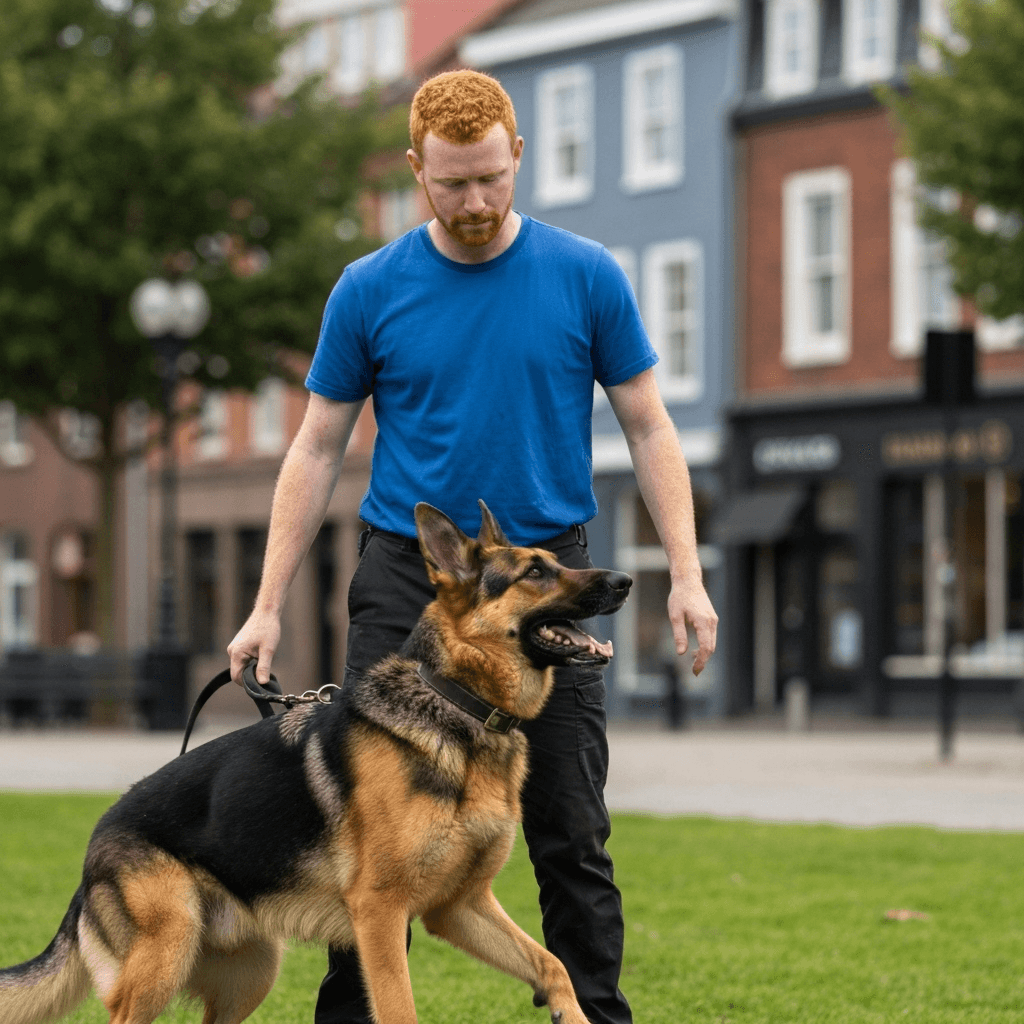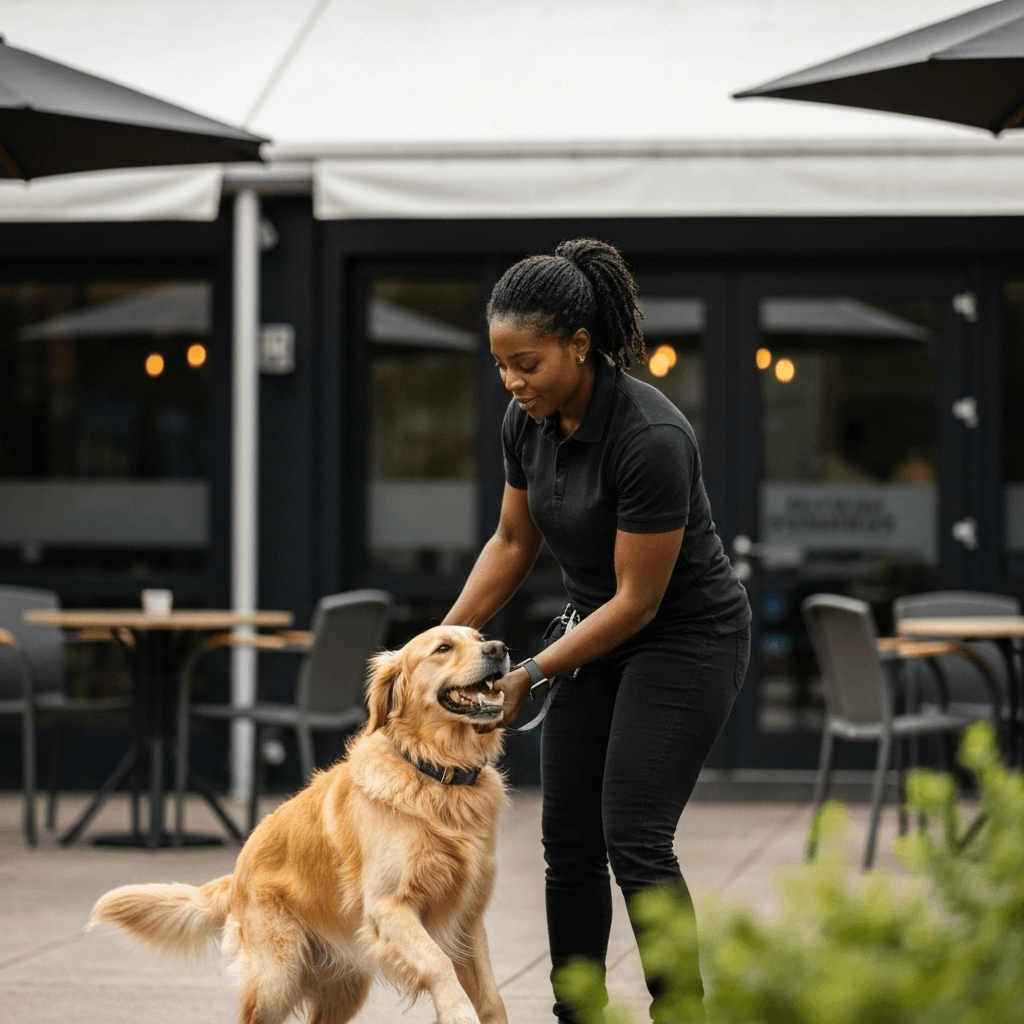Your Complete Guide to Choosing a Dog Trainer in Schenectady
Living with a dog in Schenectady means busy walks along State Street, calm focus around Mohawk Harbor, and polite manners at Central Park on weekends. A trainer who understands Stockade, Mont Pleasant, Hamilton Hill, and Woodlawn will set realistic goals for real-life success around the city.
How to Choose the Right Trainer
Start by asking about positive reinforcement training and how the trainer keeps sessions low stress. Credentials help you compare experience, so learn what common dog trainer certifications mean and how they relate to your goals.
Look for programs led by a KPA-CTP or CPDT-KA for obedience and puppy training. If your dog struggles with reactivity or anxiety, an IAABC-CDBC or CBCC-KA is the right fit.
For complex behavior issues, ask if they studied programs like CTC. Some trainers also pursue hands-on skills tests such as CPDT-KSA.
In-home training works well for door manners, leash training in your neighborhood, and house-specific behaviors. Group classes help with focus around other dogs once your pup can settle, especially before tackling downtown sidewalks or park events.
If time is tight, day training can speed up progress, with clear handoffs so you know what to practice between sessions. For advanced goals like therapy dog or service dog training, ask for a written program, clear milestones, and how teams are evaluated.
Common Dog Training Methods Explained

Reward-based methods build trust and help your dog think clearly around the distractions found in Schenectady parks and sidewalks. Basic obedience covers sit, down, stay, recall, and loose-leash skills so your dog can handle patios, festivals, and busy entrances without pulling or jumping.
Puppy classes should include socialization plans, potty training schedules, and gentle exposure to city sounds. Behavior modification is a structured plan for fear, separation anxiety, resource guarding, or aggression, using desensitization and counterconditioning.
Private lessons let you target your top priorities fast, while group classes build manners around other dogs and people. Board and train can transfer a lot of foundation skills in a short time, but always ask how owners are coached to maintain new habits at home.
The best training uses clear goals, short practices, and easy at-home homework. Your dog learns faster when you know exactly what to do between sessions.
Local Rules and Considerations in Schenectady and Schenectady County
Dogs must be under control and leashed in public areas except inside designated off-leash dog parks. A standard 6-foot leash is recommended.
New York requires every dog 4 months and older to be licensed with the municipality. In the City of Schenectady, the City Clerk handles licenses, and you’ll need proof of rabies vaccination and, if applicable, proof of spay or neuter.
State law requires a current rabies vaccination and tag. Carry bags and clean up every time to avoid fines and keep parks welcoming for everyone.
Excessive or continuous barking can be treated as a nuisance. A trainer can set up management and training to reduce alert barking.
New York does not have a special dog trainer license. Trainers operating as a business should carry general liability insurance, and a permit may be required for commercial use of city parks or large group activities.
If a program includes overnight boarding, expect zoning compliance, clear safety policies, and posted vaccination requirements for all dogs.
Average Cost of Dog Training in Schenectady (Updated for 2025)
Prices in Schenectady and Schenectady County vary by trainer experience, session length, in-home travel, and behavior complexity. Expect higher rates for serious behavior modification and for locations far from the trainer’s base.
| Service Type | Typical Price (Schenectady/Schenectady County) | Notes |
|---|---|---|
| Puppy classes (4–6 weeks) | $140–$260 total | Small groups often cost more |
| Group classes (4–6 weeks) | $160–$300 total | Obedience and manners |
| Private lessons (60–75 min) | $100–$170 per session | First visit may run longer |
| In-home coaching packages (4–6 visits) | $420–$850 total | Travel fees may apply |
| Day training (per week) | $450–$900 | Trainer works your dog and does handoff |
| Behavior consult (initial) | $130–$220 | For reactivity or anxiety |
| Board and train (2–4 weeks) | $2,100–$4,200 total | Ask about owner coaching |
| Service dog training consult | $150–$250 | Written plan required |
Always ask what’s included, how progress is tracked, and whether there is a free consultation or evaluation before committing.
Questions to Ask a Potential Dog Trainer
- What methods do you use, and how do you keep training positive and low stress?
- Which certifications do you hold, such as KPA-CTP or CPDT-KA, and what do they mean for my goals?
- How will you customize the plan for our neighborhood and daily routes in Schenectady?
- Do you offer private lessons, group classes, or day training, and which fits my dog best right now?
- How will we measure progress, and when will we raise distractions like Central Park weekends or Mohawk Harbor events?
- What are total costs, travel fees, and your cancellation policy?
- Do you carry liability insurance, and can you provide proof?
- For behavior modification, will you coordinate with my veterinarian if needed?
- What should I practice between visits, and how long should each session be?
- If I’m considering board and train, how will you transfer skills to me at home?
Local Schenectady Resources for Dog Owners
Central Park Dog Park in Schenectady has fenced off-leash areas with posted rules. Go during quieter hours to practice recalls and calm greetings.
Niskayuna Dog Park at Blatnick Park has separate areas for large and small dogs and plenty of space for recall practice. Mohawk Harbor Riverwalk is a leashed training-friendly walkway with mild distractions and changing surfaces.
Vale Park offers shaded paths to work on focus and loose-leash skills away from crowds. Plotter Kill Preserve in Rotterdam provides leashed trail work to build attention around wildlife and switchbacks.
The City of Schenectady Animal Control and City Clerk’s Office handles licensing, lost dog help, and local ordinances. Schenectady County Public Health rabies clinics offer low-cost vaccination options and schedule information.

Common Questions About Dog Training in Schenectady
How much does in-home dog training cost?
Most local trainers charge $100 to $170 per visit, with discounts for multi-session packages and a small travel fee for farther neighborhoods.
Is in-home dog training worth it?
Yes, because you fix problems where they happen, like front-door greetings, yard reactivity, or hallway excitement in multi-family buildings.
Can you pay someone to house train your dog?
Many trainers offer puppy training that includes potty training, crate comfort, and a daily schedule. Day training can speed things up.
What is the 3-3-3 rule for dog training?
Plan for about 3 days to decompress, 3 weeks to learn routines, and 3 months to feel fully settled, then match your training plan to that timeline.
How long will it take to reach my training goals?
Most friendly dogs show solid progress in 4 to 8 weeks with daily practice. Reactivity or separation anxiety can take several months.
What should I bring to group classes?
Bring a flat collar or harness, a 6-foot leash, high-value treats, water, and vaccination records if requested. Skip retractable leashes.
What’s the leash law in Schenectady?
Dogs must be leashed and under control in public areas except inside designated off-leash spaces like the dog park at Central Park.
Do I need a dog license in Schenectady or Schenectady County?
Yes. New York requires all dogs 4 months and older to be licensed with the municipality where they live, and you’ll need proof of rabies vaccination.
What shots does my dog need in Schenectady County or New York?
Rabies is required statewide. Vets commonly recommend distemper-parvo and bordetella based on your dog’s activities and exposure.
Are dog trainers required to be licensed in Schenectady or Schenectady County or New York?
There is no special state license for dog trainers. Trainers should follow normal business rules and carry liability insurance, and permits may be needed for commercial activities in city parks.
Where can I practice off-leash recall?
Use fenced dog parks like Central Park Dog Park or the Niskayuna Dog Park. Go during quiet hours to set your dog up for success.
Which dog parks allow training around Schenectady?
Central Park Dog Park in the city and the Niskayuna Dog Park in Schenectady County both allow off-leash play and practice within fenced areas.
What beaches or trails allow dogs for training?
There are no ocean beaches nearby, but leashed dogs are welcome on many local trails such as the Plotter Kill Preserve and paths around Vale Park.
Are there breed-specific rules in Schenectady?
Local dog control focuses on behavior and owner responsibility rather than breed. Expect standard leash, licensing, and nuisance rules for all dogs.
Can trainers work in city parks?
Many can, but commercial use may require a permit and proof of insurance. Ask your trainer how they handle permits and which parks they use legally.
A thoughtful plan, humane methods, and steady practice around Schenectady’s parks and neighborhoods will help your dog become confident and well-behaved at home and in the community.
